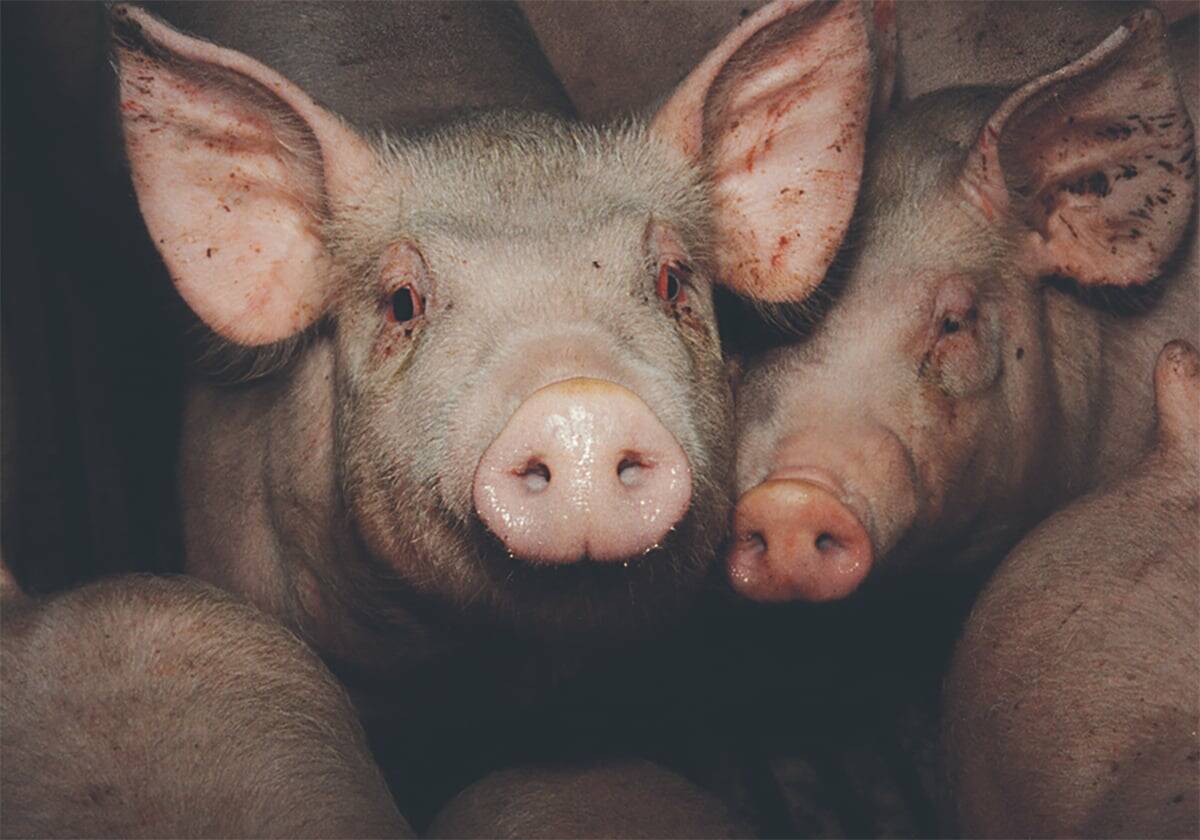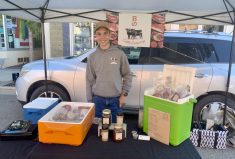Sustainable ag has been a popular term for many years but on Blue Ridge Farms, it goes beyond just farming practices.
“We have four kids who will hopefully take it over, or whoever takes it over next, we want to pass it over in really good condition,” said Jillian Byers who farms with husband Brett just east of Whitecourt.
“We want it to be a farm that is around forever, not just in our time.”
Their approach to sustainability not only includes regenerative ag practices but also a diversified business approach that includes a cow herd, pastured pigs and poultry, an on-farm shop and a whole lot of community connections.
Read Also

Scientists discover cause of pig ear necrosis
After years of research, a University of Saskatchewan research team has discovered new information about pig ear necrosis and how to control it.
Their efforts were recently recognized with the 2022 Alltech Canada Planet of Plenty award, which hailed the family as role models in sustainable agriculture and community engagement.
The farm is “feeding their local community through regenerative ranching,” the animal nutrition and crop science company said in its announcement of the award.
The couple founded their farm in 2011 and right from the start focused on regenerative ag principles they first learned about by watching YouTube videos of Joel Salatin, the well-known American farmer and lecturer who advocates “healthy grass” as the cornerstone of ranching.
They also drew on what Byers had learned from her father.
“My dad is from New Zealand — down there, you’re really managing the land for what you’ve got. We kind of took those ideologies and put them to work on our farm,” she said.
“That’s a big part of what we do around here — we manage the grass. If you don’t manage the grass, you don’t have cattle.”
They run a 400-head herd of mother cows (half owned by the couple and half by her in-laws). They employ rotational grazing (and bale grazing in winter), have fenced in their dugout and switched to solar-powered pumps, and revitalized pastures.
A decade on, those efforts have paid major dividends.
“We took fields that had zero organic matter to fields that now have six inches of beautiful organic matter that is turning into topsoil and sequestering carbon because we are getting so many different types of plants growing back from it,” she said. “We’ve increased our species diversity with legumes and grasses, and we’ve increased our water storage capacity.”
At the same time, the couple also sought to diversify and strengthen the business side of things.
“We were raising our own beef for ourselves and we got a few pigs, chickens, and turkeys,” said Byers. “Family and friends wanted some products, and then we started taking it to farmers’ markets.”
But those trips to Whitecourt, St. Albert and other communities were time consuming and the couple’s lives were only getting busier.
“We had two kids and I was pregnant with our third, and we just didn’t want to be doing farmers’ markets anymore,” she said.
However, all of those customer interactions had given them a crash course in marketing and understanding consumers, so they took the plunge and opened a store on their ranch.
Actually, for the first year, the store was housed in their garage (with Byers also making the 90-minute drive to St. Albert to deliver orders). Eventually they built a store — a small but charmingly old-timey building — and held their grand opening on Open Farm Days on August 2020.
“Over 400 people came through,” recalled Byers. “We had a line out the door for a few hours. It was a really cool thing to do.”
The retail venture also brought changes to the farm operation.
Each spring, they buy piglets and turn them loose in a big field for pastured pork. They also use a creep feeder so the pigs can self-feed (with a ration blended for them by a nutritionist) — and the animals are also an attraction for customers who love watching them rooting or just lying in the wallows.
The pigs also have a third function as pasture rejuvenators.
“They just root and dig up that big field and it comes back lush in the spring with grasses. We put the cows in there after the pigs have been butchered,” she said.
The chickens start off in a small barn and once they are “feathered out” are moved outdoors into mobile coops that Byers has created and moves along the field every day.
“It kind of looks like a greenhouse, but we just put wire over it,” she said.
Each unit can hold about 100 chickens or 25 turkeys, and Byers is now raising more than 1,000 chickens and 200 turkeys a year (which also receive formulated rations).
The farm store is open Sunday afternoons (or by appointment) and people not only come from the local area but as far afield as Edmonton and Sherwood Park.
“It’s really neat to see the community come out and start to connect with the farm and where their food comes from,” said Byers. “That’s the whole passion behind it — connecting people to their food.
“At the farmers’ market, I just saw the disconnect.”
Visitors also get to see goats and a pony, and can collect their own eggs from the chicken coop.
The Byers see their role as being part of a sustainable community.
“Our little farm can’t feed the world — we’re not trying to feed the world, but we can definitely feed our local community,” she said. “It seems like over the past two years with COVID, lots of little farms are popping up and selling their products because people were so scared when the grocery store shelves were empty.
“That was a good eye-opener for people to connect with their local farms.”
Another important aspect to all of this, said Byers, is that the economic activity on their farm ripples out to others in the community.
“Every dollar spent in my store, every dollar here is hyper-local — I’m paying for the butcher, feed and sometimes labour. Every dollar stays here, and that’s sustainable,” she said.
“As for the land, I don’t think it’s enough to be sustainable, I think we need to be reclaiming the land and really making it work.”
















